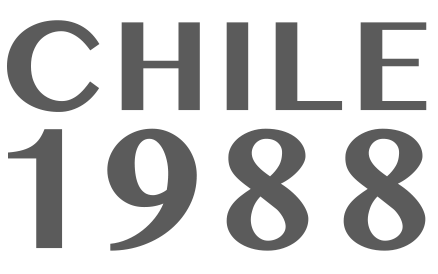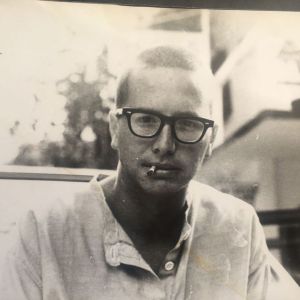I was 18, almost 19. I had entered the first year of university in law, in the Law School of the University of Chile. One of the things that we talked about among friends was that there was nothing more important to us than getting rid of Pinochet – losing a school year, sacrificing classes, etc., was a much lower cost for us at that moment. We combined our class time with reading groups on political ideology. I participated in a group of the Christian Left [political party], which was, in that moment, the most automatic and literal way to link politics to my struggle with social justice and concern for the poor. And, in fact, one day, among the many political activities we did, I went out to graffiti the walls with symbols of the NO campaign with the guy who is now the president of the Socialist party, Alvaro Elizalde, and with José Tomás Peralta and Iriarte. And on the corner of Bustamante with Rancagua, we were stopped by the CNI [the secret police]. We all started running, each in a different direction. Alvaro Elizalde managed to escape, but I ran across the park, and they caught me and put me in a car. Peralta and Iriarte were inside the car. They drove us through Santiago, they hit us, they put guns at our throat, and they left us in an empty lot in Recoleta with Americo Vespucio, which was where there were some soccer fields. And we didn’t know where we were and we ended up taking the first bus that passed by, that took us anywhere, and we went downtown to the headquarters of the NO campaign. They took us in. The CNI had taken away our ID cards so that we couldn’t vote, and they got lawyers for us, and we were able to vote. The day of the elections themselves, I participated in the parallel vote count. And at lunchtime, I went to a house that was also near Recoleta, the northern part of the city, and I was there until 5 p.m. until they told us that we had to go running with all of the counts of the votes that we had from the tables and start compiling information from all of the different voting centers, from where there were members of the parallel recount team counting the votes, to show us the votes that they had counted. So, we got into a car, and I remember that the area of Santiago near Bellas Artes had tanks in the streets.
This gave a particular climate to that day. The military was in the street that day. Later we learned that they had been thinking about doing a coup to interrupt the plebiscite. From there I went to kill time at my grandfather’s house. My grandfather was more or less right-wing. I was with him when General Matthei acknowledged the triumph of the NO vote as he was entering the Moneda. This was late at night. And I remember – I’ll never forget – that my grandfather sent me to a closet downstairs, and he said, “Take out two bottles of whiskey. You won.” I went and got them and went to meet up with my leftist, socialist, and all kinds of -ist, friends at a house on Seminario street. No, that’s wrong. That was the second step. The first step was to get together outside of the NO headquarters that was in Lastarria with Alameda. And there a group got together, which was pretty small for all that was happening, but because there was a lot of fear. And we said hello, and we hugged. And a while later, I arrived at that house on Seminario. And there an unending party started of which I only have fragmented memories, but without a doubt the best party of my life. It was like a bewitching state of complete happiness. To defeat Pinochet represented for me, and for my generation, to remove a huge cork. It was not only was the issue of human rights, but also the possibility of doing what we wanted with our lives, that books reappeared, that censorship would end, that – as my mom once told me, the great happiness for her with the triumph of the NO was that she could sleep peacefully again because her adolescent son – me – made her live with fear. In those years, I was detained by the police a lot, the protests were part of the party of every day. You went downtown, and the more leftist, the most serious, were always dressed more formally, and we, the “yellow” (more moderate), were dressed as hippies, conscious of the fact that we were wearing a kind of uniform of a protester. In those times, love, revolution, desire, were all the same thing. It was really hard to separate them. The sense of community, cause, and belonging made every relation take on a very strong intensity within this fight. You kissed passionately feeling like you were part of all of nature, and humanity, while you sang and shouted against Pinochet. Maybe that’s why that day there was a very intense amorous connection that day in all of society. A group of people formed on the corner of Apoquindo in the upper-class neighborhood, yelling at Pinochet. And a relative of my mother’s saw me and called her to say, “How is it possible that you have a son who is in the MIR [left wing revolutionary group]”? Because, for some, everyone who was not in favor of Pinochet was viewed as a terrorist. What came after that was a very long period. The 90s were an echo of the dictatorship. At a certain point, I couldn’t stand it anymore, and I went to live in Italy.


